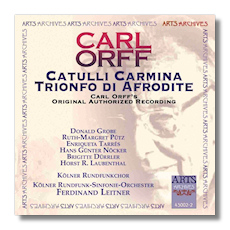
The Internet's Premier Classical Music Source
Related Links
- Orff Reviews
- Latest Reviews
- More Reviews
-
By Composer
-
Collections
DVD & Blu-ray
Books
Concert Reviews
Articles/Interviews
Software
Audio
Search Amazon
Recommended Links
Site News
 CD Review
CD Review
Carl Orff

Trionfi - Volume 2
- Catulli Carmina
- Trionfo di Afrodite
Ruth Margaret Putz, soprano
Enriqueta Tarres, soprano
Brigitte Durrler, soprano
Donald Grobe, tenor
Horst Laubenthal, tenor
Hans Gunther Nocker, bass
Cologne Radio Choir and Symphony Orchestra/Ferdinand Leitner
Arts Archives 43002-2 75m ADD
This Volume 2 of Orff's 'Trionfi' brings to the fore the composer's vision and creed of what he regarded as the sacred aspects of life as experienced in man's emotional composition and behaviour, with a particular emphasis on the dynamic power of love.
Orff does not conceive love on the worldly and heavenly duality as is very often the case, but on three different levels; lyrical, dramatic and as the divine, ordering and responsible force that drives man relentlessly forward.
To realise this huge conception, the composer turned to the poetry of the wandering scholars of the Middle Ages (in 'Carmina Burana' – the first part of the 'Trionfi' written in 1935-36), the personal writings of the Roman Catullus born in Vienna in 84 BC (in Catulli Carmina of 1943) and finally to the Greek wedding poetry of Sappho of the 6th and 7th centuries BC (in 'Trionfo di Afrodite' of 1950-51).
All three works are presented in their original language of middle Latin, Middle High German (with old French interpolations), classical Latin and early Greek in Aeolian dialect. By giving these three diverse pieces the title 'Trionfi', Orff also wanted to continue the tradition of the great pageants and masque processions of the Italian Renaissance.
As with 'Carmina' these recordings of 'Catulli' and 'Afrodite' are in the authorised version of the composer himself. Ferdinand Leitner and his Cologne forces do these works proud with interpretations full of subtle colours contrasted with fiery brilliance. Eitner, in particular, has that special knack to immerse the listener into the very heart of these dramatic yet overtly human works. He is consistent throughout, and is able to bring together all the individual parts with superb mastery. This is a truly historic issue with exemplary sound and fine annotations that should not be missed.
Copyright © 2006, Gerald Fenech




















